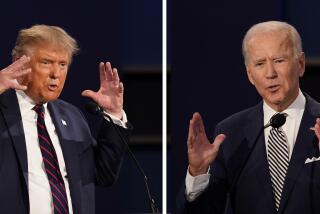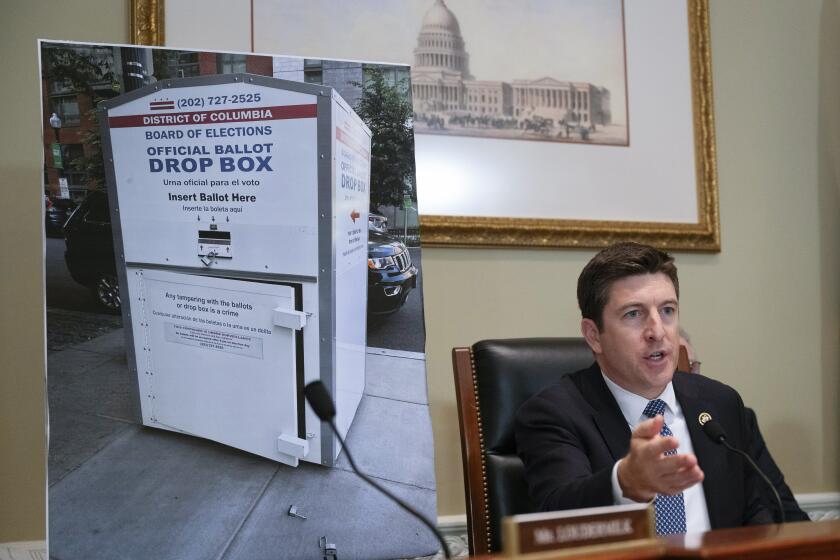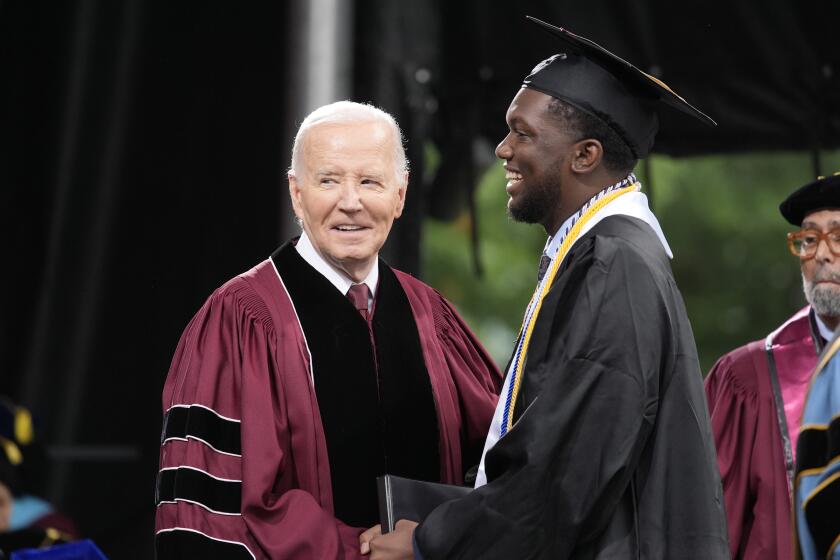Kerry Doing the Math and Scaling Back Some Plans
On his way to the top of the Democratic presidential field, Sen. John F. Kerry talked a lot about his plans for helping average Americans -- with programs like universal preschool and college tuition subsidies.
The presumptive Democratic nominee pledged to deliver the new services while also taking just four years to halve a federal deficit projected at $477 billion for the current fiscal year.
Now, his advisors are working on a comprehensive federal budget to make sure proposals announced last summer still add up. And Kerry has said some of his plans will have to be scaled back.
The candidate said he remained committed to early-childhood education for all and paying tuition for college students who provided day care and other social services, but on a slower schedule.
The changes come with an election-style showdown already at hand, months before either of the two major parties has formally nominated its candidate and with Kerry fighting to demonstrate he is fiscally sensible, not a stereotypical tax-and-spend liberal.
President Bush and other Republicans have been quick to jump on any sign of vacillation by the Massachusetts senator. They are likely to attack Kerry’s shifts as flip-flops and evidence of a fiscal miscalculation.
Kerry’s camp says the fiscal rejiggering isn’t something he planned on. Instead, the Democratic candidate said he had been forced to recalibrate earlier proposals because the Bush administration had driven up the federal deficit so much that there was now less money to launch some initiatives.
The first effort by Kerry to lower expectations came in a meeting Monday with students at a Sacramento job training center.
“I’m already relooking at some of my programs I’ve proposed,” Kerry said. “For example, I want to do across-the-board early-childhood education, which is very expensive. We’re probably only going to be able to do a pilot program at first and then expand it.”
A day later, the candidate made a similar statement about his “Service for College” initiative, which would have the federal government pay the four-year college tuition of students who provided two years of service to their communities. The start of the tuition plan would be “modest,” Kerry said, “because of the deficit this administration has created and our responsibility not to shoulder it on to you.”
Kerry intends to make a more definitive statement on his priorities within the next two weeks, when he is scheduled to roll out a comprehensive budget proposal.
Without the Democrat’s plan in place, Republicans have filled the vacuum with their own charges -- including the accusation that Kerry would raise taxes $900 billion over 10 years.
Kerry has never advocated such a tax increase. But his opponents contend he will have to propose such a tax hike to fulfill his promise of reducing the deficit and expanding healthcare.
Kerry’s advisors say it is Republican fiscal irresponsibility alone that has led to their candidate’s shifts.
“The biggest changes you have had are in the size of the deficit. When we first talked about these programs, we didn’t have all the billions in costs in Iraq,” said Kerry spokesman David Wade.
“And the cost of the new Medicare prescription benefit for seniors, perhaps intentionally underestimated by the Bush administration, has gone way up” -- from the initial publicized price tag of $400 billion to at least $534 billion.
Sarah Bianchi, policy director for the Kerry campaign, said it was possible Kerry would modify other proposals because budget projections had “gotten $1 trillion worse over a 10-year period” since his plans were first drawn up last summer.
Kerry has made no mention of scaling back his most ambitious proposals, including a major expansion of healthcare. A new analysis released Friday by an Emory University researcher lowered the estimated cost of Kerry’s proposal -- which would extend health coverage to more uninsured Americans and make premiums more affordable for others -- from nearly $900 billion to $653 billion.
Kerry has talked about slowing just two initiatives that have been less central to his campaign.
The first is early-childhood education. Throughout most of the Democratic primary season, Kerry said he wanted to make preschool “available and affordable for every American child.” He pointed to studies that showed children who prepared for kindergarten performed much better throughout their school careers.
The candidate never specified how long it would take to reach his goal of providing preschool for all children ages 3 to 5. Kerry said last week that a pilot project would provide time to persuade the public and policymakers the initiative was important.
The Democrat has said his program would be more modest than the comprehensive $60-billion-a-year proposal made by one of his Democratic rivals, Ohio Rep. Dennis J. Kucinich.
The second Kerry proposal now to be reduced is “Service for College.” Under the initiative, Kerry would offer Americans the chance to earn the equivalent of their state’s four-year public college tuition in exchange for two years of service. Previously, he called for phasing the program in over 10 years, with half a million young people eventually receiving tuition in exchange for their public work.
On Tuesday, he told a crowd of more than 2,000 students at UC San Diego that he would have to go slowly on the plan. Kerry said it would initially be more “modest.” He did not elaborate.
One Democratic strategist said the ongoing calculations by Kerry were standard for campaigns, which must balance the views of “people who want to create initiatives and do things proactively, and other people who have to draw up budgets.”
“Part of what they are figuring is, ‘How much are we going to position ourselves as deficit hawks and how much are we going to talk about new programs?’ ”
More to Read
Get the L.A. Times Politics newsletter
Deeply reported insights into legislation, politics and policy from Sacramento, Washington and beyond. In your inbox three times per week.
You may occasionally receive promotional content from the Los Angeles Times.







